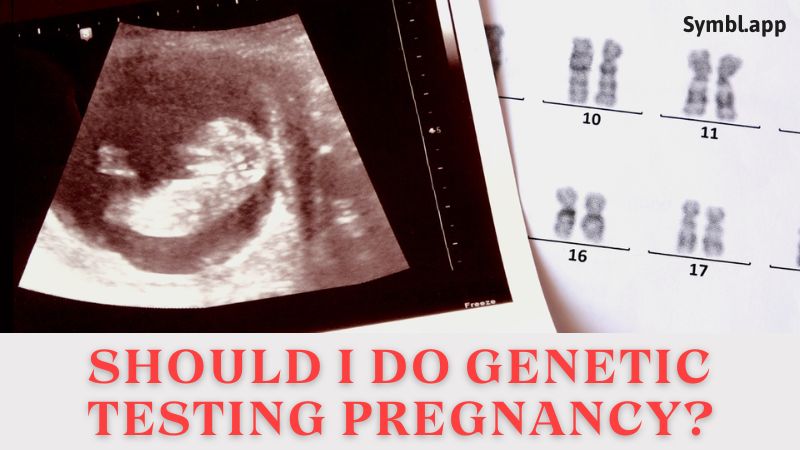Genetic testing during pregnancy has become an increasingly common practice, offering valuable insights into the health and well-being of the fetus. However, the decision to undergo genetic testing is a deeply personal one, influenced by various factors such as medical history, age, personal beliefs, and emotional readiness. In this article, Symbl.app explore the considerations involved in “should I do genetic testing pregnancy”, aiming to provide guidance for expectant parents facing this important choice.
Genetic Testing During Pregnancy: Understanding the Considerations
Should I do genetic testing pregnancy? It’s a question that weighs heavily on the minds of many expectant parents, and rightfully so. Genetic testing offers the opportunity to detect certain genetic conditions or chromosomal abnormalities in the fetus, providing crucial information for decision-making regarding the pregnancy and potential medical interventions.

Medical History: Evaluating Risk Factors and Genetic Concerns
Medical history plays a significant role in the decision-making process. For some individuals, a family history of genetic disorders or the knowledge of being carriers of certain genetic conditions raises concerns about the risk of passing these conditions to their child. In such cases, genetic testing during pregnancy may be recommended by healthcare providers as a proactive measure to assess the likelihood of inherited conditions being passed on to the baby. Consequently, the question of “should I do genetic testing pregnancy” becomes particularly pertinent for these individuals, as the results of such testing could have significant implications for their family’s future health.
Advanced Maternal Age: Assessing the Need for Genetic Testing
Advanced maternal age is another factor that often prompts expectant parents to consider genetic testing. Should I do genetic testing pregnancy if I’m of advanced maternal age? This question arises because women aged 35 and older have a higher risk of chromosomal abnormalities, such as Down syndrome, in their pregnancies. Genetic testing, such as noninvasive prenatal testing (NIPT), can provide valuable information about the likelihood of chromosomal abnormalities, empowering parents to make informed decisions about the pregnancy and potential medical interventions.

Personal Beliefs and Values: Considering Ethical and Cultural Perspectives
However, the decision to undergo genetic testing during pregnancy is not solely based on medical factors. Personal beliefs and values also play a significant role. For some individuals, the question of “should I do genetic testing pregnancy” is influenced by cultural or religious beliefs that may impact their views on prenatal testing and its implications. It’s essential for expectant parents to consider how their personal beliefs and values align with the potential outcomes of genetic testing and whether they feel comfortable proceeding with such testing based on these considerations.
Emotional Readiness: Coping with Potential Outcomes
Beyond personal beliefs, emotional readiness is another crucial aspect to consider when contemplating genetic testing during pregnancy. The question of “should I do genetic testing pregnancy” is not merely a matter of weighing the benefits and risks; it also involves acknowledging the emotional impact of receiving the test results. Genetic testing results can sometimes yield unexpected or concerning news about the baby’s health, leading to anxiety, stress, and uncertainty for expectant parents. It’s essential for individuals to assess their emotional preparedness for the possibility of receiving such news and to ensure they have adequate support systems in place to cope with any outcomes.
Understanding Testing Options: NIPT, Amniocentesis, and CVS
When considering genetic testing during pregnancy, it’s important for expectant parents to understand the different types of testing available and their respective benefits, risks, and limitations. Noninvasive prenatal testing (NIPT) is a widely used option that involves analyzing cell-free fetal DNA in the maternal blood to screen for common chromosomal abnormalities, such as Down syndrome, with a high degree of accuracy. While NIPT is considered safe and noninvasive, it is not diagnostic and may yield false-positive or false-negative results, necessitating further confirmatory testing.

Amniocentesis and chorionic villus sampling (CVS) are invasive diagnostic tests that involve sampling amniotic fluid or placental tissue to analyze fetal chromosomes directly. While these tests provide more definitive results than NIPT, they carry a slightly higher risk of miscarriage and are typically offered to individuals at increased risk of chromosomal abnormalities based on their medical history or screening results.
Seeking Guidance: The Role of Healthcare Providers and Genetic Counselors
In addition to discussing the available testing options with their healthcare provider, expectant parents may also benefit from seeking guidance from a genetic counselor. Genetic counselors are trained professionals who can provide expert advice, support, and information about genetic testing options, as well as help individuals navigate the complex emotional and ethical considerations involved in prenatal testing decisions.
Conclusion: Should I Do Genetic Testing Pregnancy?
Ultimately, the question of “should I do genetic testing pregnancy” is a deeply personal one that requires careful consideration of medical, ethical, and emotional factors. While genetic testing can offer valuable insights into the health of the fetus and empower expectant parents to make informed decisions about their pregnancy, it’s essential for individuals to weigh the benefits and risks of testing and consider how their personal beliefs, values, and emotional readiness factor into the decision-making process. By taking the time to explore these considerations and seeking guidance from healthcare professionals and genetic counselors, expectant parents can make a decision that aligns with their values and provides peace of mind as they navigate the journey of pregnancy and parenthood.
